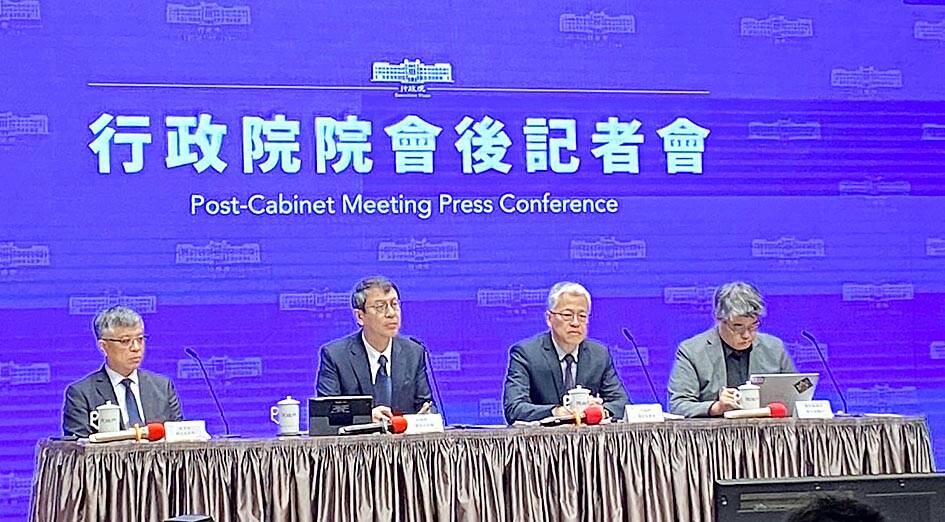The Cabinet yesterday approved draft amendments to the Nationality Act (國籍法) to ease residency requirements for some foreign professionals applying for naturalization and to allow social welfare agencies to apply for naturalization on behalf of stateless children who are residents.
The proposed amendments were approved by the Cabinet in September last year, but had to be reapproved and resubmitted because of the new legislative term that began on Feb. 1.
The Ministry of the Interior said that the draft amendments would help improve the retention of professional talent by cutting the required period of residency for “foreign high-level professionals” (外國高級專業人才) applying for citizenship from three continuous years, defined as being in the country for at least 183 days each year.

Photo: Chung Li-hua, Taipei Times
The required period of residency would be shortened to two continuous years, or a legal stay of more than five consecutive years for those who do not meet the 183 days per year requirement, the ministry said.
It has previously said that the changes would aid Taiwan’s efforts to recruit and naturalize foreign basketball players to play for the national team, a change that the national basketball association has sought.
To better protect children’s rights, the draft amendments include a new provision that allows social welfare authorities or institutions that act as guardians of stateless children to apply for Republic of China (ROC) nationality on their behalf, the ministry said.
Under the existing law, only adoptive parents of stateless people who are unmarried minors can apply for naturalization on their behalf, if at least one of the parents is an ROC citizen, the ministry said.
In addition, as Taiwan has amended its Civil Code to lower the legal age of majority from 20 to 18, the draft also changes the wording “unmarried minors” in the Nationality Act to “unmarried and under the age of 18.”

Taiwan is gearing up to celebrate the New Year at events across the country, headlined by the annual countdown and Taipei 101 fireworks display at midnight. Many of the events are to be livesteamed online. See below for lineups and links: Taipei Taipei’s New Year’s Party 2026 is to begin at 7pm and run until 1am, with the theme “Sailing to the Future.” South Korean girl group KARA is headlining the concert at Taipei City Hall Plaza, with additional performances by Amber An (安心亞), Nick Chou (周湯豪), hip-hop trio Nine One One (玖壹壹), Bii (畢書盡), girl group Genblue (幻藍小熊) and more. The festivities are to

Auckland rang in 2026 with a downtown fireworks display launched from New Zealand’s tallest structure, Sky Tower, making it the first major city to greet the new year at a celebration dampened by rain, while crowds in Taipei braved the elements to watch Taipei 101’s display. South Pacific countries are the first to bid farewell to 2025. Clocks struck midnight in Auckland, with a population of 1.7 million, 18 hours before the famous ball was to drop in New York’s Times Square. The five-minute display involved 3,500 fireworks launched from the 240m Sky Tower. Smaller community events were canceled across New Zealand’s

‘IRRESPONSIBLE’: Beijing’s constant disruption of the ‘status quo’ in the Taiwan Strait has damaged peace, stability and security in the Indo-Pacific region, MOFA said The Presidential Office yesterday condemned China’s launch of another military drill around Taiwan, saying such actions are a “unilateral provocation” that destabilizes regional peace and stability. China should immediately stop the irresponsible and provocative actions, Presidential Office spokeswoman Karen Kuo (郭雅慧) said, after the Chinese People’s Liberation Army (PLA) yesterday announced the start of a new round of joint exercises around Taiwan by the army, navy and air force, which it said were approaching “from different directions.” Code-named “Justice Mission 2025,” the exercises would be conducted in the Taiwan Strait and in areas north, southwest, southeast and east of Taiwan

‘SLICING METHOD’: In the event of a blockade, the China Coast Guard would intercept Taiwanese ships while its navy would seek to deter foreign intervention China’s military drills around Taiwan this week signaled potential strategies to cut the nation off from energy supplies and foreign military assistance, a US think tank report said. The Chinese People’s Liberation Army (PLA) conducted what it called “Justice Mission 2025” exercises from Monday to Tuesday in five maritime zones and airspace around Taiwan, calling them a warning to “Taiwanese independence” forces. In a report released on Wednesday, the Institute for the Study of War said the exercises effectively simulated blocking shipping routes to major port cities, including Kaohsiung, Keelung and Hualien. Taiwan would be highly vulnerable under such a blockade, because it